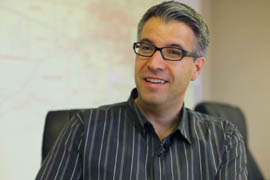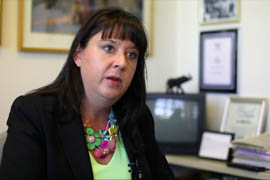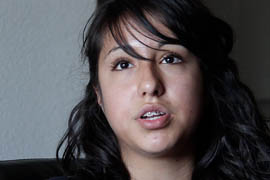Cronkite News has moved to a new home at cronkitenews.azpbs.org. Use this site to search archives from 2011 to May 2015. You can search the new site for current stories.
Advocates, officials spar over handling early ballots in Arizona
PHOENIX – In the run-up to last year’s general election, several political action groups worked to get residents of low-income and high-minority neighborhoods on Maricopa County’s permanent early voting list.
As Nov. 6 approached, those groups had thousands of volunteers knocking on doors to encourage people to mail back those ballots and, if voters couldn’t for any reason, offering to deliver ballots to the county.
“We’re in this to really be able to give a community a voice,” said Petra Falcon, executive director of Promise Arizona, a Latino rights group that mobilized one of the larger ballot-collection efforts. “Voting is the very first step to doing that.”
Falcon estimated that her more than 2,100 volunteers collected and submitted several thousand ballots and turned them in to the Maricopa County Elections Department. Citizens for a Better Arizona estimated that it collected and submitted at least 4,000 ballots.
Leaders of both groups say collecting and submitting early ballots is a way of addressing historically low voting rates among Latinos and other minorities. While state law allows early voters to drop off ballots at any polling place in their county if they can’t mail them back by election day, those leaders say minorities are less likely to do so because of work or because they feel that candidates don’t care about their concerns.
Randy Parraz, head of Citizens for a Better Arizona, said the goal is making sure someone who may not otherwise return an early ballot for any reason has his or her voice heard.
“It would end up in the garbage had we not sat with them, because they didn’t care that much because no one asked them for their vote” Parraz said.
To a top Republican lawmaker, however, it’s too easy for those who collect ballots to not do what they promise – destroying or failing to submit them, for example.
Sen. Michele Reagan, R-Scottsdale, chairwoman of the Senate Elections Committee, pushed this legislative session for Arizona to follow the lead of California and other states that have banned the practice or placed restrictions on how it can be done.
SB 1003 would bar those working or volunteering for third-party political organizations from collecting and submitting another person’s early ballot. A voter could still designate someone else to submit the ballot – a friend or spouse, for example.
As approved by the Senate, a violation would carry a felony charge.
“There is no other state that allows an individual to walk into a polling place with thousands of ballots,” Reagan said. “Not one other state. So if other states have restrictions, why is it so shocking that Arizona would chose to look at, have some restrictions too?”
It’s one of two election reform bills pushed by Reagan that have drawn the ire of civil rights groups and Democrats. The other, SB 1261, would allow counties to purge names from permanent early voting lists under certain circumstances and make it illegal for another person to alter a voter registration form without the registrant’s consent.
Both bills cleared the Senate on party-line votes but as of early May hadn’t received votes on the House floor.
The bills were a response to the November 2012 election, which drew national attention to Arizona because of the record number of provisional ballots cast and perceived delays in counting all the votes. Several Senate Democrats sent a letter to the U.S. Department of Justice in March asking for the Civil Rights Division to watch the legislation because they said it would disproportionately impact minorities who rely more on third-party political groups and are more likely to have recently signed up for permanent early voting lists.
Testifying before the Senate Elections Committee in February, Maricopa County Elections Director Karen Osborne said SB 1003 would help secure ballots. She noted that some voters, including two people in her office, reported people posing as county election workers coming to their homes, asking who they voted for and asking to take their early ballots.
“It is very, very difficult to understand why somebody would do that,” she said. “It can’t happen, it makes the public nervous.”
Tammy Patrick, Maricopa County Elections federal compliance officer, echoed that concern in an interview.
“Why are they asking for who somebody voted for?” Patrick said. “Does that mean that they’re not going to turn in the ballot? Does that mean they’re going to destroy it? Does that mean that they’ll wait and turn it in so it’s late if it’s somebody that they didn’t want to win?”
Many states allow some form of mail-in voting, and most of them have rules on who can submit another person’s ballot. In Alaska, for instance, a person must have power of attorney for an individual they’re submitting a ballot for. Colorado and Arkansas cap the number of ballots that may be submitted.
Reagan’s bill is based on a California statute that has barred anyone affiliated with political campaigns from returning mail-in ballots since 2001.
A bill similar to SB 1003 made it through the Legislature and was signed by Gov. Jan Brewer in 2011. Sponsored by Sen. Don Shooter, R-Yuma, it would have required that anybody who delivers more than 10 ballots would have to provide a copy of his or her photo ID. That law never went into effect because the state withdrew it from a required review of proposed changes to Arizona’s election procedures by the U.S. Department of Justice.
Citizens for a Better Arizona, a political action group that helped lead the recall efforts of former state Sen. Russell Pearce, was perhaps the most successful ballot-collecting group during the November 2012 election season. The group collected more than 4,000 ballots, according to Parraz, the group’s leader. He said his volunteers were open with their support for Paul Penzone, a Democrat who ran against Maricopa County Sheriff Joe Arpaio.
“For every person, we went up to and asked them, ‘Can we count on you to support Paul Penzone for sheriff?’ and if they said no, we didn’t collect their ballot,” Parraz said. “We left them alone. So we didn’t take ballots for Arpaio and throw them away, we just didn’t want their ballot.”
State Sen. Steve Gallardo, D-Phoenix, said in an interview that SB 1003 is unnecessary and, if it becomes law, would be tied up on federal court as he and opponents challenge it.
“It may not be the wisest thing to give your ballot to someone you don’t know, but that comes from voter education,” he said.
Doug Chapin, an elections expert at the University of Minnesota who studies election procedures, said that election administrators generally don’t seem to have a problem with third-party ballot collection.
“That’s something they’re relatively neutral on as long as they know what the rules are,” Chapin said. “If you are going to allow somebody to pick up a ballot, you want to make sure there’s some sort of proof of chain of custody.”
Chapin said that the debate over who can handle a voter’s ballot is more politically contentious than other election procedure debates.
“Limiting who can handle ballots, how many they can handle, and who can take them brings far more political, racial and ethnic baggage,” he said.
Gallardo said restricting ballot collection would hit low income and minority voters harder than other groups because the third-party political groups that do so primarily work in those neighborhoods.
“Mi Familia Vota, Promise Arizona, look at all the organizations,” Gallardo said. “They’ve targeted one area: low income areas, predominantly black and Hispanic … they have turned out a lot of black and brown voters to participate and now we have people who suddenly have a problem with how this is done.”
Rosa Romero, a 15-year-old Chandler high school student, said she spent many hours volunteering for the Adios Arpaio” campaign organized by Promise Arizona and Unite Here, a union representing hospitality workers. That included encouraging people to return early ballots and offering to submit them.
She said she ran into people who didn’t support what she was doing but found many more who did.
“I went to one lady’s house and she really thanked me for going to her house because she said if it wasn’t for me, that I picked up her ballot, she would have not voted,” Romero said.
Reagan said her bill wouldn’t prevent people like Romero or groups like Promise Arizona or Citizens for a Better Arizona from trying to engage low-income and minority voters. The bill is aimed at protecting people’s ballots, she said.
“This is all about the voters and making it better for them and their election system,” Reagan said, “and to make sure that their voters are counted and that they’re counted in a timely fashion.”
CORRECTION: A previous version of this story gave an incomplete accounting of organizations in charge of the “Adios Arpaio,” campaign. Those groups include Unite Here, a union representing hospitality workers in Arizona, as well as Promise Arizona.









